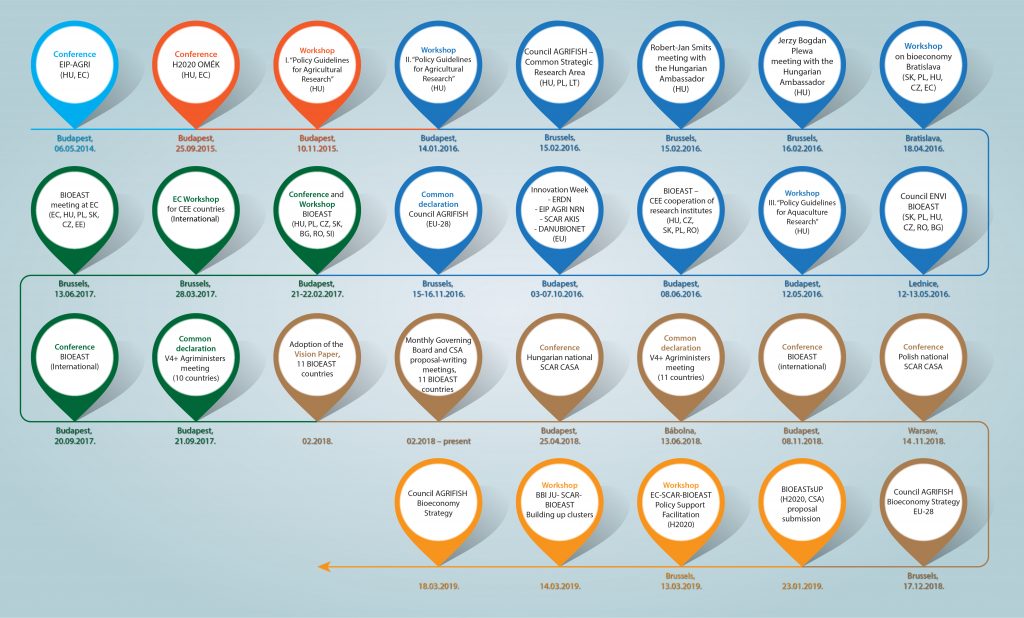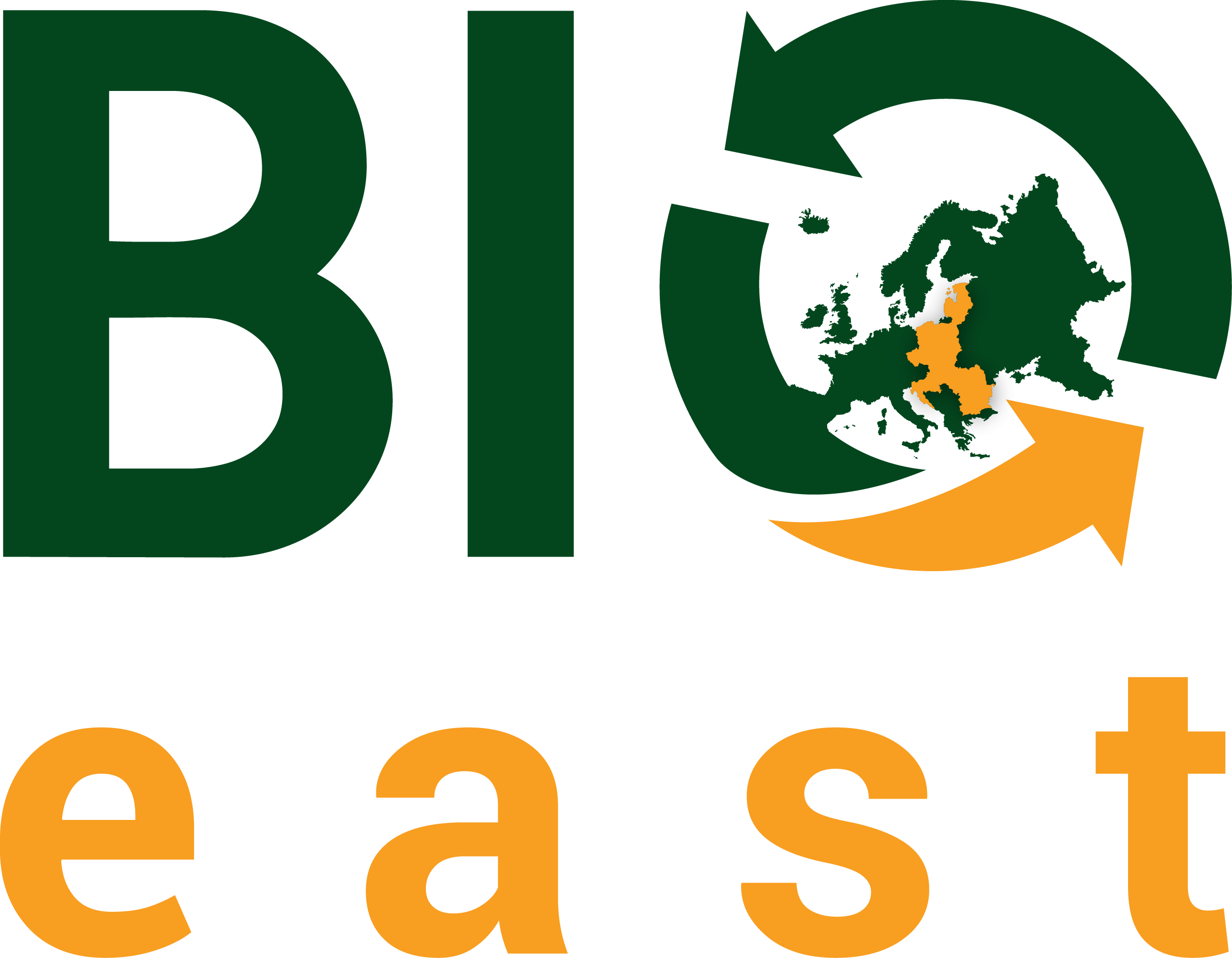Setting up the Initiative

BIOEAST countries are committed to working together and to contributing to the further development of the ERA by organising joint programming exercises. A long-term process was initiated in 2015. The macro-regional research and innovation needs of the CEE countries have thus been communicated at the political and expert levels several times. Support from all the EU Member States and the European Commission is now crucial to maintaining the commitment of the supporting countries and organisations. Among the numerous CEE actions are the following milestones:
- The EU Bioeconomy Strategy – How to develop the Hungarian Research and Innovation Agenda conference held during the National Agriculture and Food Exhibition (OMÉK in Hungarian) in Budapest. This was jointly organised by the Hungarian Ministry of Agriculture and the Research Institute of Agricultural Economics and took place on 25 September 2015;
- AGRIFISH COUNCIL – policy discussion concerning (a) the Fourth SCAR Foresight and (b) EU strategy in the field of agricultural research and innovation, presenting the position for more effective use of the research potential of the EU-13 in the field of agriculture within Horizon 2020. Events were held on 15 December 2015 (a) and 15 February 2016 (b);
- Presentation and repetition position during SCAR works since the end of 2015;
- Active participation in the consultation process on long-term EU strategy in the field of research and innovation in agriculture – consultation conducted by the European Commission from December 2015 to January 2016;
- Priority of the Polish Presidency of the Visegrad Group (2016-2017): More effective use of the research potential of the V4 countries in the field of agriculture within Horizon 2020;
- Policy Guidelines for Agricultural Research workshops (I, II, III) organised jointly by the Hungarian Ministry of Agriculture, the Research Institute of Agricultural Economics and the Hungarian Chamber of Agriculture on 10 November 2015, 14 January 2016, 27 and 31 May 2016, and 3 June 2016 in Budapest, Pápa, Kecskemét and Debrecen, Hungary (with Hungarian participants – researchers, farmers, advisors and other stakeholders);
- Robert-Jan Smits meeting with the Hungarian Ambassador on 15 February 2016 and Jerzy Bogdan Plewa meeting with the Hungarian Ambassador on 16 February 2016;
- Workshop on the bioeconomy on 18 April 2016 in Bratislava, participants came from the Czech Republic, Hungary, Poland, Slovakia and the European Commission;
- BIOEAST-CEE Cooperation between research institutes organised by the Research Institute of Agricultural Economics, Hungary on 8 June 2016 in Budapest; participants came from the Czech Republic, Hungary, Poland and Slovakia and Romania;
- Budapest Innovation Week (comprising the annual conference of the European Rural Development Network, a meeting of the Standing Committee of Agricultural Research (SCAR) Strategic Working Group on Agricultural Knowledge and Innovation Systems (AKIS), and a workshop in the frame of the DANUBIONET project), organised in Budapest by the Hungarian Ministry of Agriculture, the Research Institute of Agricultural Economics and the Hungarian Chamber of Agriculture from 3 to 7 October 2016;
- Lodz Declaration signed on 6 October 2016;
- Bratislava Bioeconomy Conference organised by the Slovak Presidency together with European Commission under the auspices of SCAR held on 17 October 2016;
- Common efforts under the Polish Presidency of the Visegrad Group – Meeting of the Ministers of Agriculture of the V4+3, adoption of the Visegrad4+3 Common Declaration for the stronger inclusion of the research potential of the EU-13 Member States in the implementation of projects within Horizon 2020 in the field of agriculture and the bioeconomy, with common proposals of topics – part of the Visegrad4+3 Common Declaration signed on 26 October 2016 in Warsaw;
- AGRIFISH Council held on 15 November 2016 – official presentation of the Visegrad4+3 Common Declaration broadly supported by the Member States and the European Commission prior to the Council meeting, a letter addressing the European Commissioners (Moedas and Hogan);
- COMPET Council AOB point on 29 November 2016;
- The BIOEAST initiative was presented to and welcomed by Visegrad4 Agriculture Chambers on 1-2 December 2016 in Balatonfüred, Hungary;
- SCAR Plenary meeting including ’Bioeconomy developments’ in Brussels on 6 December 2016, where the Visegrad4+3 Common Declaration and the BIOEAST Initiative were presented;
- SC2 Programme Committee meeting – Presentation of the Visegrad4+3 Common Declaration on 18 January 2017;
- The BIOEAST initiative was presented and discussed at a COPA-COGECA Working Party on Research in Brussels on 15 February 2017;
- BIOEAST workshop in Budapest organised by the Hungarian Ministry of Agriculture in cooperation with the Research Institute of Agricultural Economics and the Hungarian Chamber of Agriculture on 21-22 February 2017. The aim was to deepen cooperation in the field of agricultural research in the bioeconomy. During the workshop some common research topics were further developed by research experts representing these countries.
- The Hungarian Ministry of Agriculture organised a high level conference in Budapest, which took place during the Science Festival “Science Festival: Science without borders” in Budapest on 8 November. The conference was a cornerstone in the evolution of the BIOEAST Initiative, setting the bioeconomy research and innovation agenda for Horizon 2020 and Horizon Europe.
- The high-level conference, BIOEAST as a driving force in the context of the European Green Deal, took place in Brussels in February 2020.
In June 2020 the BIOEAST Board issued the position paper BIOECONOMY and Green Investments, reaffirming its commitment to assist the elaboration of knowledge-based BE solutions for Central and Eastern Europe.
